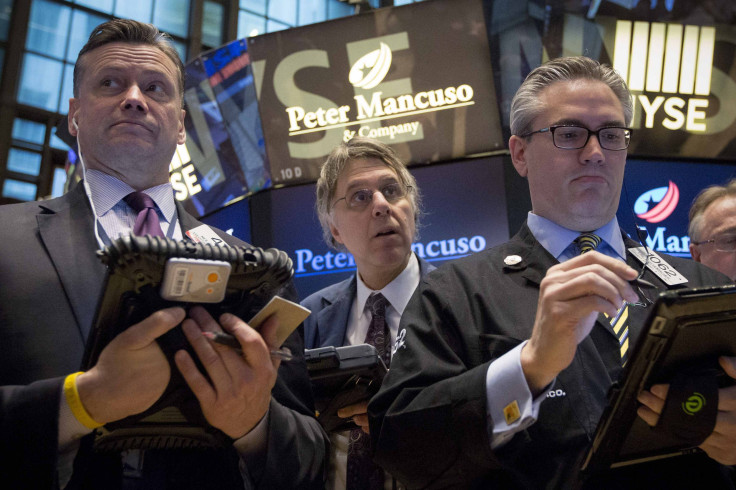Dow Jones Industrial Average Drops 100 Points As Investors Digest Janet Yellen Speech, FOMC Statement

U.S. stocks traded mostly lower Thursday as investors took a breather a day after the Federal Reserve hinted the central bank is on course to raise interest rates as early as June. The Federal Open Market Committee (FOMC) also downgraded its outlook for the U.S. economy this year, signaling that the Fed may take a more cautious approach to raising rates.
In morning trading Thursday, the Dow (INDEXDJX:.DJI), which measures the share prices of 30 large industrial companies, dropped 100.01 points, or 0.55 percent, to 17,976.18. The Standard & Poor's 500 stock index (INDEXNASDAQ:.IXIC) lost 9.69 points, or 0.46 percent, to 2,089.81. The Nasdaq composite (INDEXSP:.INX) dipped 1.40 points, or 0.03 percent, to 4,981.43.
Apple Inc. (NASDAQ:AAPL), the world’s most-valuable company, officially kicked off trading on the Dow on Thursday, replacing telecommunications company AT&T Inc., which had been on the blue-chip index since 1916. The move came because of Visa Inc.’s 4-1 stock split, which brought down the collective average of the price-weighted Dow and created a need for a pricier stock in the index. Shares of Apple edged up 0.48 percent in early trading Thursday to $129.06.
Separately, data showed the number of Americans filing for unemployment benefits remained steady last week as initial claims rose by 1,000 to a seasonally adjusted 291,000 for the week ended March 14, the Labor Department said Thursday. Economists had expect claims to rise 3,000 to 292,000 last week, according to analysts polled by Thomson Reuters.
U.S. equities opened lower, a day after stocks soared more than 1 percent as the Fed dropped the word “patient” from its monetary policy statement, moving a step closer to raising rates. However, investors continued to digest the central bank’s economic projections, which were lower than previously forecast.
U.S. gross domestic product is expected to grow 2.3 percent to 2.7 percent this year, down sharply from the central bank's estimate of 2.6 percent to 3 percent in December, the FOMC said in its economic projections Wednesday. Meanwhile, inflation is forecast to come in at 1.3 percent or 1.4 percent, also below previous forecasts.
Fed Chairwoman Janet Yellen also cautioned Wednesday that a strengthening U.S. dollar is expected to weigh on exports and inflation, as well as placing a "notable drag” on the central bank’s outlook. After suffering its worst daily decline in 18 months Wednesday, the U.S. dollar index rallied more than 1 percent Thursday to $98.98, while the euro fell to $1.07085 against the greenback.
© Copyright IBTimes 2024. All rights reserved.












